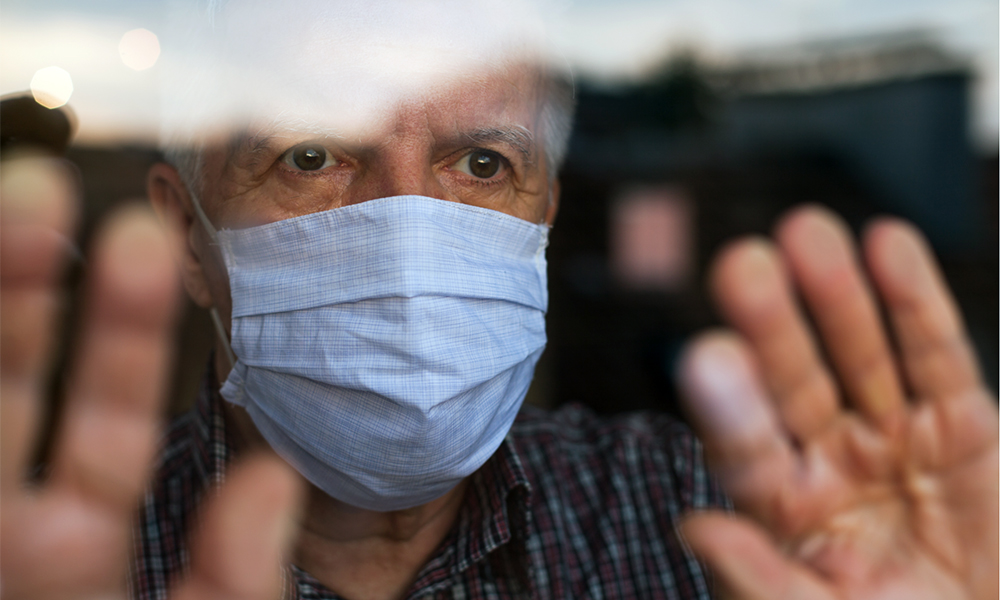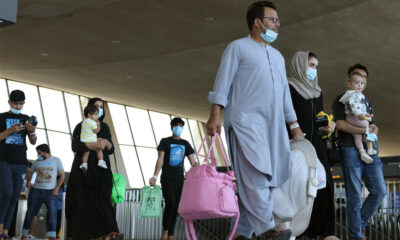COVID-19
Older adults who contracted COVID-19 at risk of Alzheimer’s

A study published this week in the Journal of Alzheimer’s Disease reports older people who contracted COVID-19 are at greater risk of developing the disease.
Experts said Alzheimer's is a severe and challenging disease that must be closely monitored, especially since many became infected with COVID-19.
According to the study age is also considered an essential factor in Alzheimer's disease. At an alarming rate, older adults, 65 years old and older, are at risk. Women at least 85 years old are prone.
According to the US National Institute on Aging, the term Alzheimer's disease came from Dr. Alois Alzheimer, who in 1906 studied the unusual changes in a woman's brain tissue.
In the examination, Dr. Alzheimer discovered that the woman's brain had abnormal clumps and tangles. Symptoms were language problems and memory loss.
The National Institute for Aging said what is alarming about the disease is that it slowly damages memory and the brain system.
This latest study reviewed and analyzed anonymous electronic health records. In total, they had 6.2 million adults, from 65 years old and older, living in the United States. They looked into the patients who received medical treatment from February 2020 to May 2021 and with no prior diagnosis of Alzheimer's disease.
Following infection with COVID-19, the study found that the risk of Alzheimer's disease in older people increased from 0.35% to 0.68% over a year.
Moreover, the researchers explained that it is still unclear how or whether the COVID-19 virus triggers the development of Alzheimer's disease among old adults.
The study's author, Pamela Davis, said that the factors in the development of Alzheimer's disease are poorly understood. She added that the two important pieces are prior infections (especially viral infections) and inflammation.
Davis explained that the infection of SARS-CoV-2 is associated with the central nervous system, and her team wanted to find out if COVID-19 could lead to increased diagnoses.
COVID-19
WHO declares end to COVID global health emergency

The World Health Organization said Friday that COVID-19 no longer qualifies as a global emergency, marking a symbolic end to the devastating coronavirus pandemic that triggered once-unthinkable lockdowns, upended economies and killed millions of people worldwide.
The announcement, made more than three years after WHO declared the coronavirus an international crisis, offers some relief, if not an ending, to a pandemic that stirred fear and suspicion, hand-wringing and finger-pointing across the globe, AP reported.
The U.N. health agency’s officials said that even though the emergency phase was over, the pandemic hasn’t finished, noting recent spikes in cases in Southeast Asia and the Middle East.
WHO says thousands of people are still dying from the virus every week, and millions of others are suffering from debilitating, long-term effects.
“It’s with great hope that I declare COVID-19 over as a global health emergency,” WHO Director-General Tedros Adhanom Ghebreyesus said.
“That does not mean COVID-19 is over as a global health threat,” he said, warning that new variants could yet emerge. Tedros noted that while the official COVID-19 death toll was 7 million, the real figure was estimated to be at least 20 million.
Tedros said the pandemic had been on a downward trend for more than a year, acknowledging that most countries have already returned to life before COVID-19.
He bemoaned the damage that COVID-19 had done to the global community, saying the pandemic had shattered businesses, exacerbated political divisions, led to the spread of misinformation and plunged millions into poverty.
When the U.N. health agency first declared the coronavirus to be an international crisis on Jan. 30, 2020, it hadn’t yet been named COVID-19 and there were no major outbreaks beyond China.
More than three years later, the virus has caused an estimated 764 million cases globally and about 5 billion people have received at least one dose of vaccine.
In the U.S., the public health emergency declaration made regarding COVID-19 is set to expire on May 11, when wide-ranging measures to support the pandemic response, including vaccine mandates, will end. Many other countries, including Germany, France and Britain, dropped most of their provisions against the pandemic last year.
When Tedros declared COVID-19 to be an emergency in 2020, he said his greatest fear was the virus’ potential to spread in countries with weak health systems.
Most recently, WHO has struggled to investigate the origins of the coronavirus, a challenging scientific endeavor that has also become politically fraught.
COVID-19
COVID-19 in Iran: Nearly 900 new cases, 24 deaths recorded

The Iranian health ministry announced on Sunday that more than 890 new cases of COVID-19 have been identified across the country during the past 24 hours, adding that 24 patients have died in the same period of time, Fars News Agency reported.
"A sum of 891 new patients infected with COVID-19 have been identified in the country based on confirmed diagnosis criteria during the past 24 hours," the Iranian Health Ministry's Public Relations Center said on Sunday, adding, "454 patients have been hospitalized during the same time span."
The ministry’s public relations center said 611 people infected with COVID-19 are in critical condition.
COVID-19
China says 200 million treated, pandemic ‘decisively’ beaten

China says more than 200 million of its citizens have been diagnosed and treated for COVID-19 since it lifted strict containment measures beginning in November.
With 800,000 of the most critically ill patients having recovered, China has “decisively beaten” the pandemic, according to notes from a meeting of the ruling Communist Party’s all-powerful Politburo Standing Committee presided over by President and party leader Xi Jinping, AP reported.
China enforced some of the world’s most draconian lockdowns, quarantines and travel restrictions and still faces questions about the origins of the virus that was first detected in the central Chinese city of Wuhan in late 2019. Heavy-handed enforcement prompted rare anti-government protests and took a heavy toll on the world’s second-largest economy.
The official Xinhua News Agency quoted Xi as saying that policies to control the outbreak had been “entirely correct.” The abrupt lifting in November and December of the “zero COVID” policy that had sought to eliminate all cases of the virus led to a surge in infections that temporarily overwhelmed hospitals.
Case numbers have since peaked and life has largely returned to normal, although international travel in and out of China has yet to return to pre-pandemic levels.
China is now transitioning to a post-pandemic stage after a fight against the outbreak that was “extraordinary in the extreme,” Xinhua said.
The government will continue to “optimize and adjust prevention and control policies and measures according to the times and situations with a strong historical responsibility and strong strategic determination,” Xinhua said.
-

 Sport4 days ago
Sport4 days agoRashid Khan puts victory in sight for Afghanistan v Zimbabwe
-

 Tahawol4 days ago
Tahawol4 days agoTahawol: Iran’s deportation of 3 million Afghan refugees
-

 Saar4 days ago
Saar4 days agoSaar: Increase in Durand Line clashes discussed
-

 Sport3 days ago
Sport3 days agoAfghanistan triumphs in Test victory against Zimbabwe
-

 Latest News4 days ago
Latest News4 days agoPakistan has right to attack TTP in Afghanistan: PM’s adviser
-

 Latest News3 days ago
Latest News3 days agoIran will use ‘all means’ to restore water rights from Afghanistan
-

 Regional5 days ago
Regional5 days agoFour killed, 32 injured in explosion in Pakistan
-

 Latest News4 days ago
Latest News4 days agoIranian MP says dam construction in Afghanistan is ‘questionable’
























